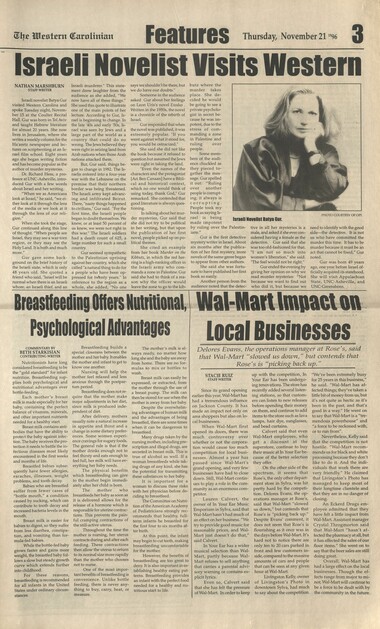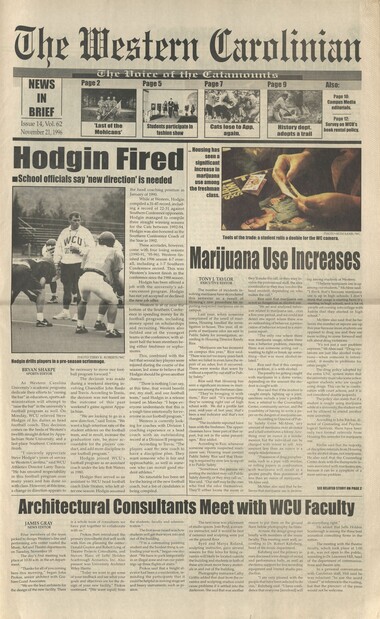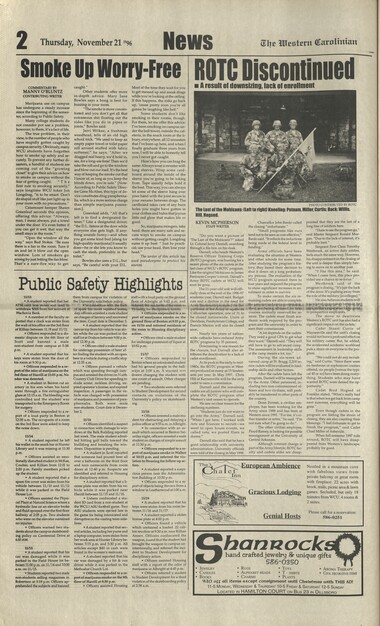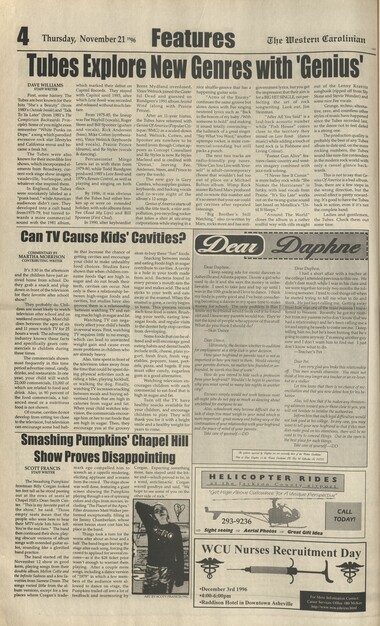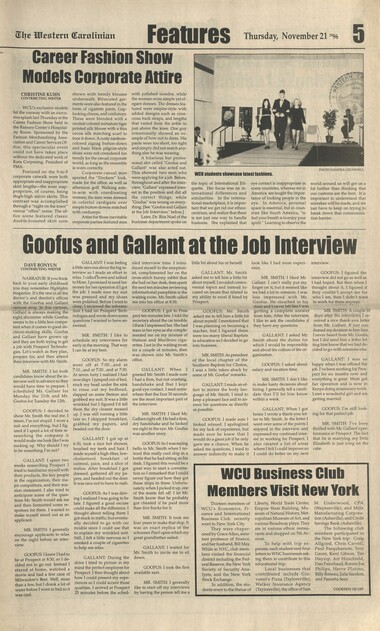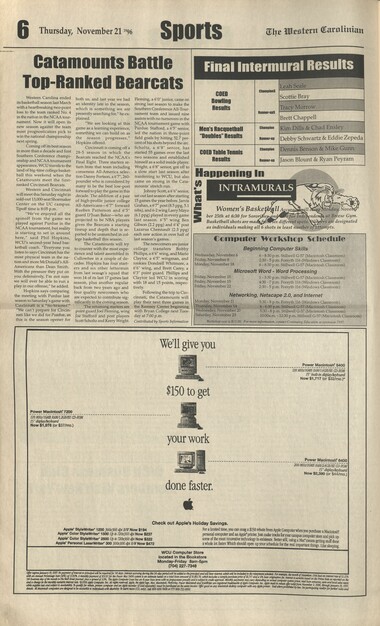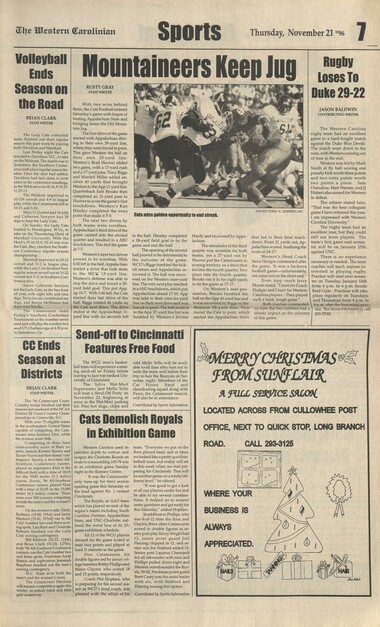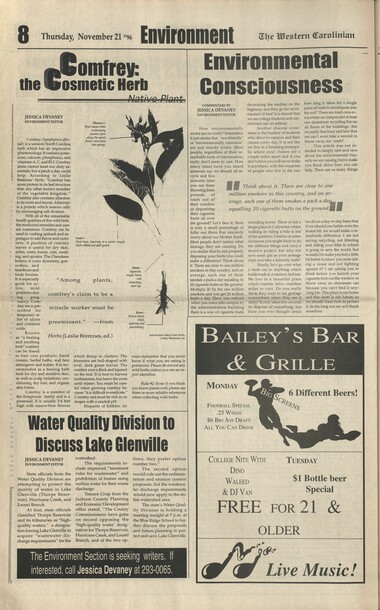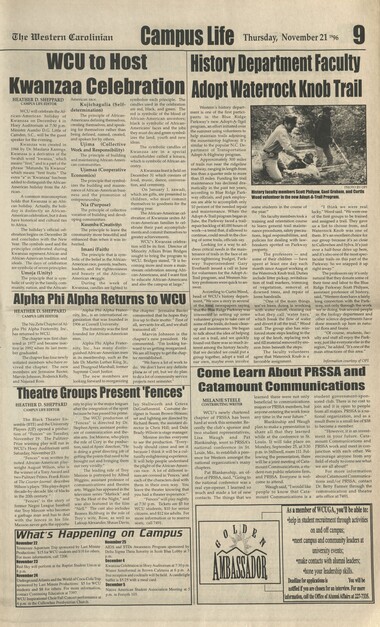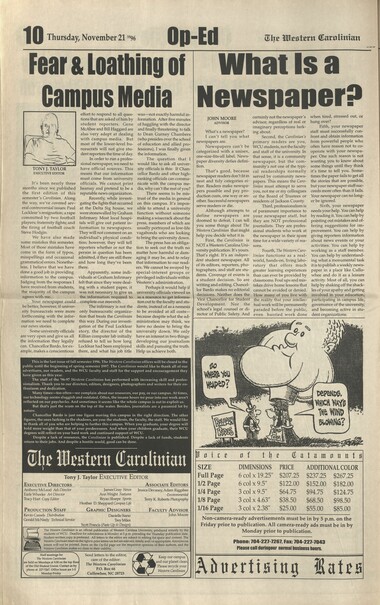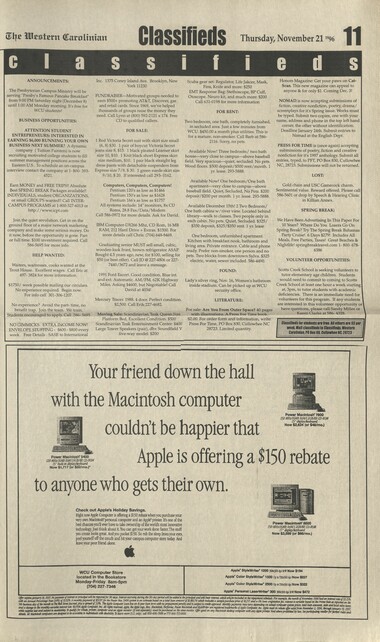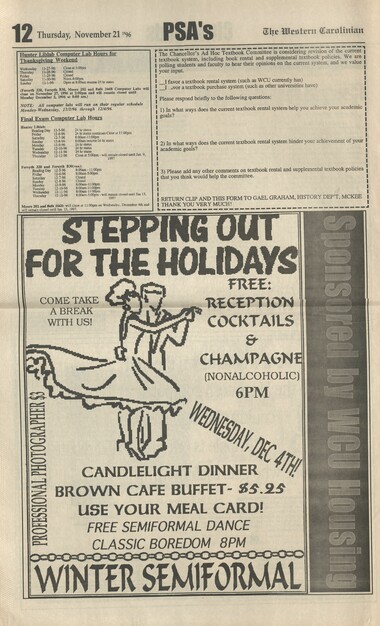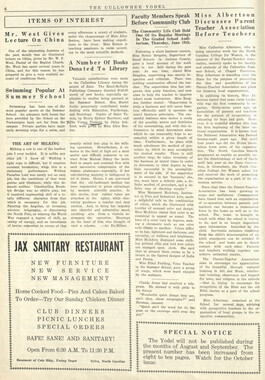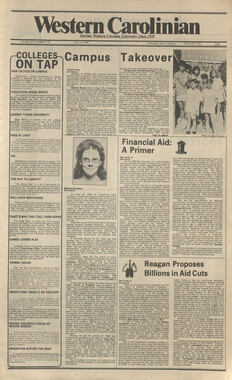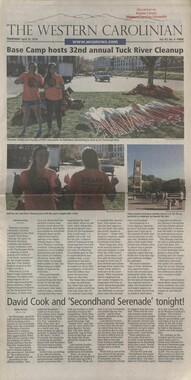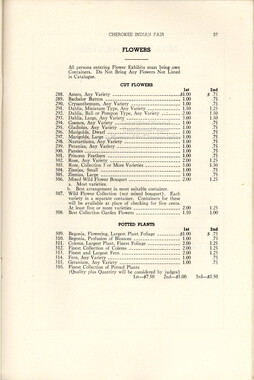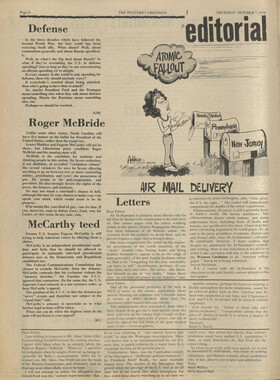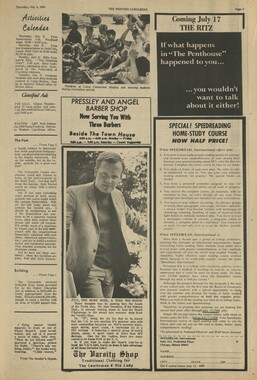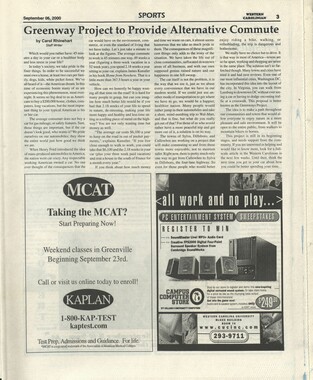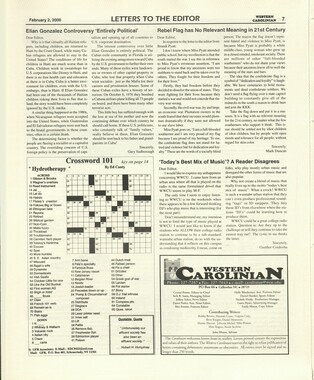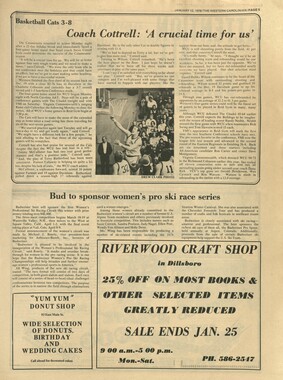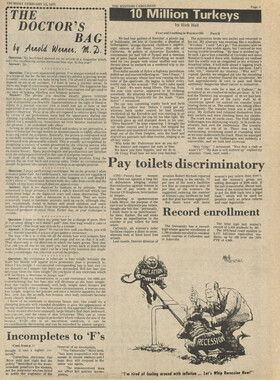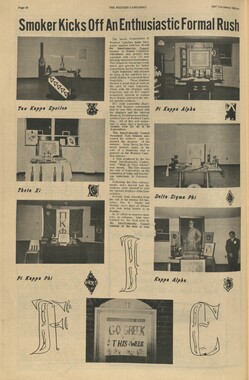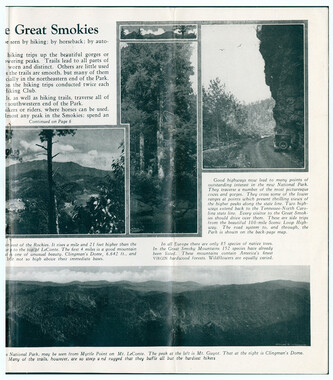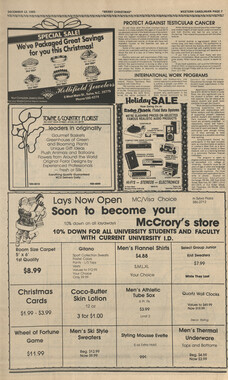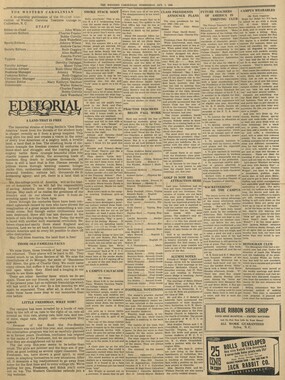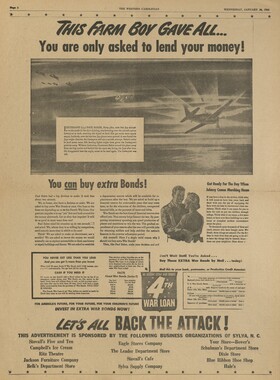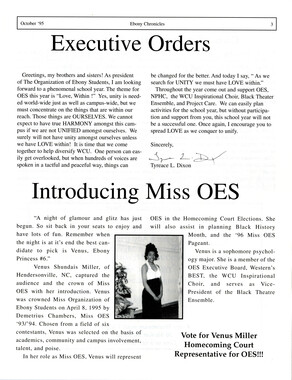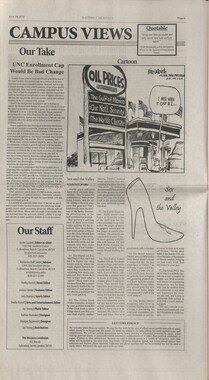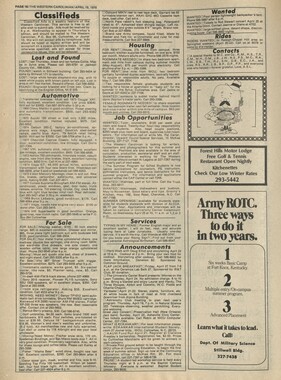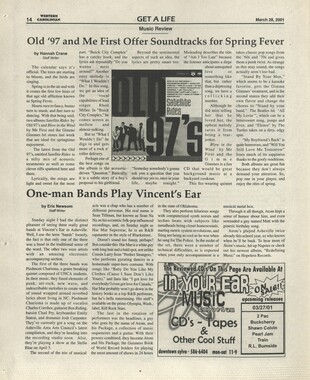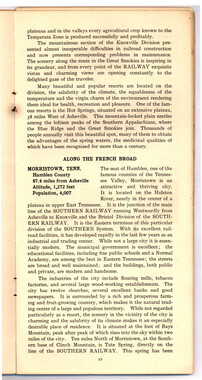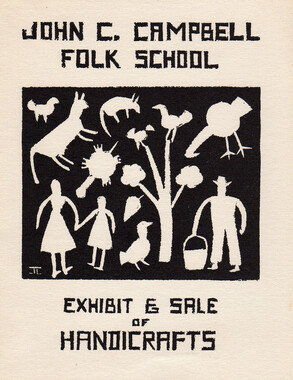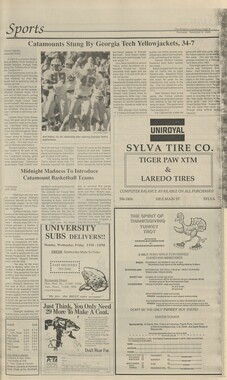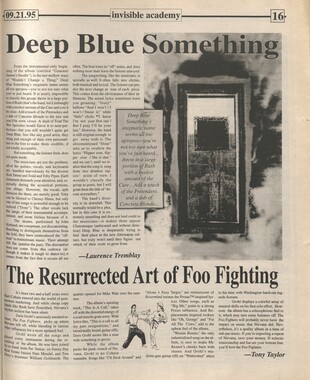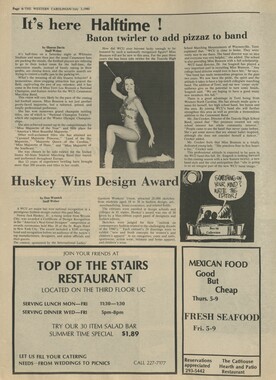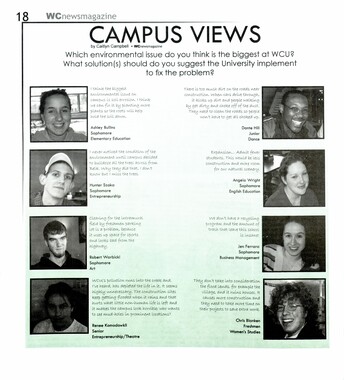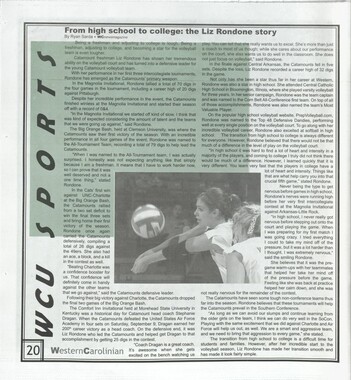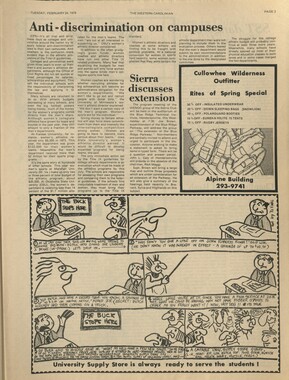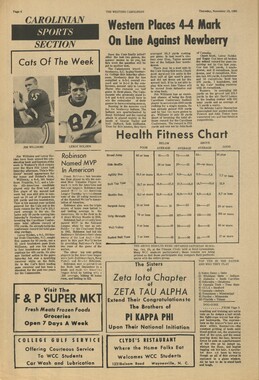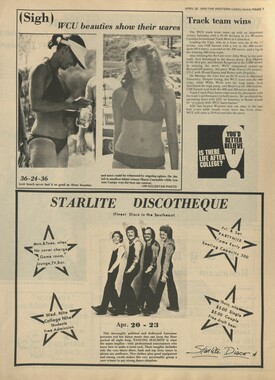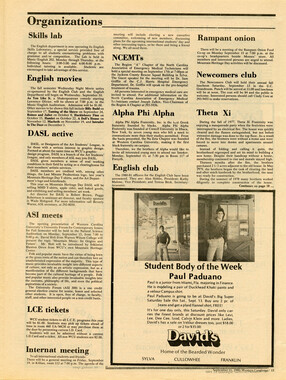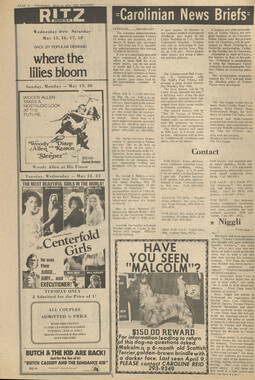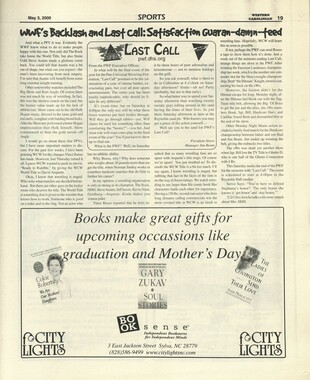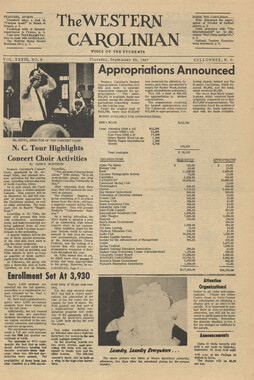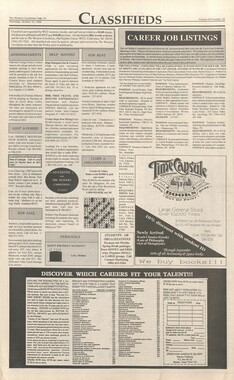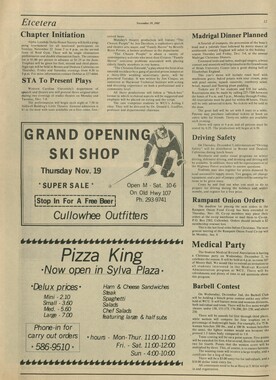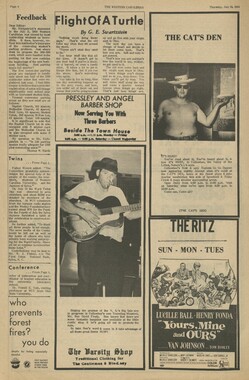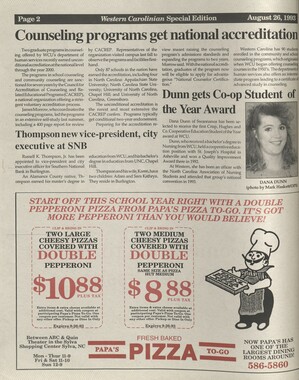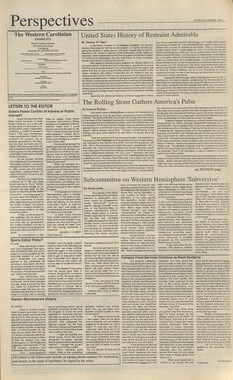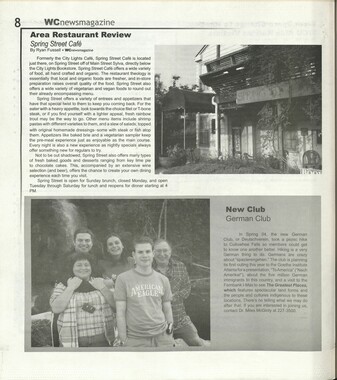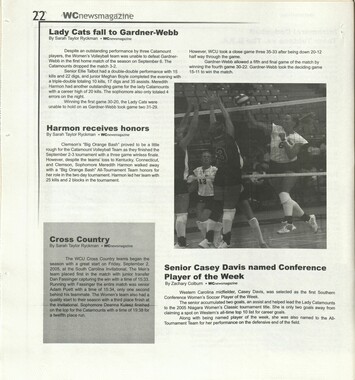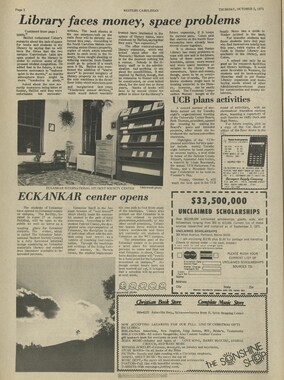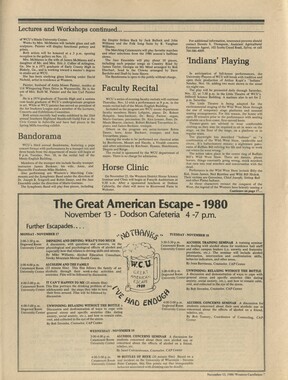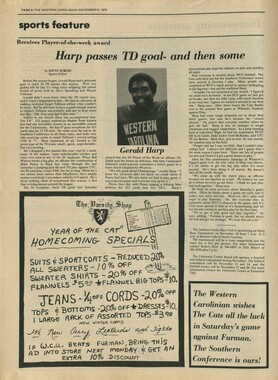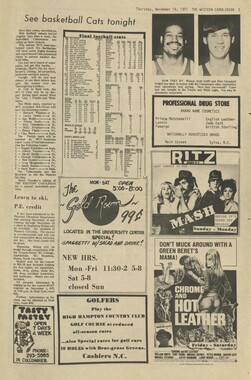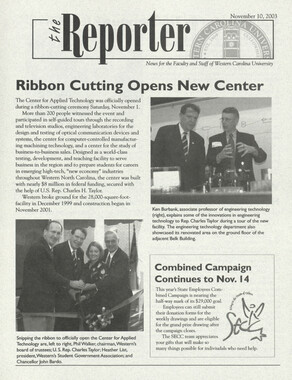Western Carolina University (20)
View all
- Canton Champion Fibre Company (2308)
- Cherokee Traditions (291)
- Civil War in Southern Appalachia (165)
- Craft Revival (1942)
- Great Smoky Mountains - A Park for America (2946)
- Highlights from Western Carolina University (430)
- Horace Kephart (941)
- Journeys Through Jackson (159)
- LGBTQIA+ Archive of Jackson County (85)
- Oral Histories of Western North Carolina (314)
- Picturing Appalachia (6873)
- Stories of Mountain Folk (413)
- Travel Western North Carolina (160)
- Western Carolina University Fine Art Museum Vitreograph Collection (129)
- Western Carolina University Herbarium (92)
- Western Carolina University: Making Memories (738)
- Western Carolina University Publications (2488)
- Western Carolina University Restricted Electronic Theses and Dissertations (146)
- Western North Carolina Regional Maps (71)
- World War II in Southern Appalachia (131)
University of North Carolina Asheville (6)
View all
- Allanstand Cottage Industries (62)
- Appalachian National Park Association (53)
- Bennett, Kelly, 1890-1974 (1463)
- Berry, Walter (76)
- Brasstown Carvers (40)
- Carver, George Washington, 1864?-1943 (26)
- Cathey, Joseph, 1803-1874 (1)
- Champion Fibre Company (233)
- Champion Paper and Fibre Company (297)
- Cherokee Indian Fair Association (16)
- Cherokee Language Program (22)
- Crowe, Amanda (40)
- Edmonston, Thomas Benton, 1842-1907 (7)
- Ensley, A. L. (Abraham Lincoln), 1865-1948 (275)
- Fromer, Irving Rhodes, 1913-1994 (70)
- George Butz (BFS 1907) (46)
- Goodrich, Frances Louisa (120)
- Grant, George Alexander, 1891-1964 (96)
- Heard, Marian Gladys (60)
- Kephart, Calvin, 1883-1969 (15)
- Kephart, Horace, 1862-1931 (313)
- Kephart, Laura, 1862-1954 (39)
- Laney, Gideon Thomas, 1889-1976 (439)
- Masa, George, 1881-1933 (61)
- McElhinney, William Julian, 1896-1953 (44)
- Niggli, Josephina, 1910-1983 (10)
- North Carolina Park Commission (105)
- Osborne, Kezia Stradley (9)
- Owens, Samuel Robert, 1918-1995 (11)
- Penland Weavers and Potters (36)
- Roberts, Vivienne (15)
- Roth, Albert, 1890-1974 (142)
- Schenck, Carl Alwin, 1868-1955 (1)
- Sherrill's Photography Studio (2565)
- Southern Highland Handicraft Guild (127)
- Southern Highlanders, Inc. (71)
- Stalcup, Jesse Bryson (46)
- Stearns, I. K. (213)
- Thompson, James Edward, 1880-1976 (226)
- United States. Indian Arts and Crafts Board (130)
- USFS (683)
- Vance, Zebulon Baird, 1830-1894 (1)
- Weaver, Zebulon, 1872-1948 (58)
- Western Carolina College (230)
- Western Carolina Teachers College (282)
- Western Carolina University (2005)
- Western Carolina University. Mountain Heritage Center (18)
- Whitman, Walt, 1819-1892 (10)
- Wilburn, Hiram Coleman, 1880-1967 (73)
- Williams, Isadora (3)
- Cain, Doreyl Ammons (0)
- Crittenden, Lorraine (0)
- Rhodes, Judy (0)
- Smith, Edward Clark (0)
- Appalachian Region, Southern (2569)
- Asheville (N.C.) (1923)
- Avery County (N.C.) (26)
- Blount County (Tenn.) (195)
- Buncombe County (N.C.) (1672)
- Cherokee County (N.C.) (283)
- Clay County (N.C.) (555)
- Graham County (N.C.) (236)
- Great Smoky Mountains National Park (N.C. and Tenn.) (519)
- Haywood County (N.C.) (3569)
- Henderson County (N.C.) (70)
- Jackson County (N.C.) (4909)
- Knox County (Tenn.) (35)
- Knoxville (Tenn.) (13)
- Lake Santeetlah (N.C.) (10)
- Macon County (N.C.) (420)
- Madison County (N.C.) (215)
- McDowell County (N.C.) (39)
- Mitchell County (N.C.) (132)
- Polk County (N.C.) (35)
- Qualla Boundary (982)
- Rutherford County (N.C.) (76)
- Swain County (N.C.) (2182)
- Transylvania County (N.C.) (270)
- Watauga County (N.C.) (12)
- Waynesville (N.C.) (86)
- Yancey County (N.C.) (72)
- Aerial Photographs (3)
- Aerial Views (60)
- Albums (books) (4)
- Articles (1)
- Artifacts (object Genre) (228)
- Bibliographies (1)
- Biography (general Genre) (2)
- Cards (information Artifacts) (38)
- Clippings (information Artifacts) (191)
- Copybooks (instructional Materials) (3)
- Crafts (art Genres) (622)
- Depictions (visual Works) (21)
- Design Drawings (1)
- Drawings (visual Works) (185)
- Envelopes (73)
- Exhibitions (events) (1)
- Facsimiles (reproductions) (1)
- Fiction (general Genre) (4)
- Financial Records (12)
- Fliers (printed Matter) (67)
- Glass Plate Negatives (381)
- Guidebooks (2)
- Internegatives (10)
- Interviews (815)
- Land Surveys (102)
- Letters (correspondence) (1013)
- Manuscripts (documents) (618)
- Maps (documents) (177)
- Memorandums (25)
- Minutes (administrative Records) (59)
- Negatives (photographs) (6090)
- Newsletters (1290)
- Newspapers (2)
- Notebooks (8)
- Occupation Currency (1)
- Paintings (visual Works) (1)
- Pen And Ink Drawings (1)
- Periodicals (193)
- Personal Narratives (10)
- Photographs (12976)
- Plans (maps) (1)
- Poetry (5)
- Portraits (4568)
- Postcards (329)
- Programs (documents) (181)
- Publications (documents) (2440)
- Questionnaires (65)
- Relief Prints (26)
- Sayings (literary Genre) (1)
- Scrapbooks (282)
- Sheet Music (2)
- Slides (photographs) (402)
- Songs (musical Compositions) (2)
- Sound Recordings (796)
- Specimens (92)
- Speeches (documents) (18)
- Tintypes (photographs) (8)
- Transcripts (322)
- Video Recordings (physical Artifacts) (23)
- Text Messages (0)
- A.L. Ensley Collection (275)
- Appalachian Industrial School Records (7)
- Appalachian National Park Association Records (336)
- Axley-Meroney Collection (2)
- Bayard Wootten Photograph Collection (20)
- Bethel Rural Community Organization Collection (7)
- Blumer Collection (5)
- C.W. Slagle Collection (20)
- Canton Area Historical Museum (2110)
- Carlos C. Campbell Collection (462)
- Cataloochee History Project (64)
- Cherokee Studies Collection (4)
- Daisy Dame Photograph Album (5)
- Daniel Boone VI Collection (1)
- Doris Ulmann Photograph Collection (112)
- Elizabeth H. Lasley Collection (1)
- Elizabeth Woolworth Szold Fleharty Collection (4)
- Frank Fry Collection (95)
- George Masa Collection (173)
- Gideon Laney Collection (452)
- Hazel Scarborough Collection (2)
- Hiram C. Wilburn Papers (28)
- Historic Photographs Collection (236)
- Horace Kephart Collection (861)
- Humbard Collection (33)
- Hunter and Weaver Families Collection (1)
- I. D. Blumenthal Collection (4)
- Isadora Williams Collection (4)
- Jesse Bryson Stalcup Collection (47)
- Jim Thompson Collection (224)
- John B. Battle Collection (7)
- John C. Campbell Folk School Records (80)
- John Parris Collection (6)
- Judaculla Rock project (2)
- Kelly Bennett Collection (1482)
- Love Family Papers (11)
- Major Wiley Parris Civil War Letters (3)
- Map Collection (12)
- McFee-Misemer Civil War Letters (34)
- Mountain Heritage Center Collection (4)
- Norburn - Robertson - Thomson Families Collection (44)
- Pauline Hood Collection (7)
- Pre-Guild Collection (2)
- Qualla Arts and Crafts Mutual Collection (12)
- R.A. Romanes Collection (681)
- Rosser H. Taylor Collection (1)
- Samuel Robert Owens Collection (94)
- Sara Madison Collection (144)
- Sherrill Studio Photo Collection (2558)
- Smoky Mountains Hiking Club Collection (616)
- Stories of Mountain Folk - Radio Programs (374)
- The Reporter, Western Carolina University (510)
- Venoy and Elizabeth Reed Collection (16)
- WCU Gender and Sexuality Oral History Project (32)
- WCU Mountain Heritage Center Oral Histories (25)
- WCU Oral History Collection - Mountain People, Mountain Lives (71)
- WCU Students Newspapers Collection (1920)
- Western North Carolina Tomorrow Black Oral History Project (69)
- William Williams Stringfield Collection (2)
- Zebulon Weaver Collection (109)
- African Americans (390)
- Appalachian Trail (35)
- Artisans (521)
- Cherokee art (84)
- Cherokee artists -- North Carolina (10)
- Cherokee language (21)
- Cherokee pottery (101)
- Cherokee women (208)
- Church buildings (189)
- Civilian Conservation Corps (U.S.) (111)
- College student newspapers and periodicals (2009)
- Dams (107)
- Dance (1023)
- Education (222)
- Floods (61)
- Folk music (1015)
- Forced removal, 1813-1903 (2)
- Forest conservation (220)
- Forests and forestry (1184)
- Gender nonconformity (4)
- Great Smoky Mountains National Park (N.C. and Tenn.) (181)
- Hunting (45)
- Landscape photography (25)
- Logging (119)
- Maps (83)
- Mines and mineral resources (8)
- North Carolina -- Maps (18)
- Paper industry (38)
- Postcards (255)
- Pottery (135)
- Railroad trains (72)
- Rural electrification -- North Carolina, Western (3)
- School integration -- Southern States (2)
- Segregation -- North Carolina, Western (5)
- Slavery (5)
- Sports (452)
- Storytelling (243)
- Waterfalls -- Great Smoky Mountains (N.C. and Tenn.) (66)
- Weaving -- Appalachian Region, Southern (280)
- Wood-carving -- Appalachian Region, Southern (328)
- World War, 1939-1945 (173)
Western Carolinian Volume 62 Number 14
Item
Item’s are ‘child’ level descriptions to ‘parent’ objects, (e.g. one page of a whole book).
-
-
®ij£ Hestern (ftarnltman Features Thursday, November 2119% 3 Israeli Novelist Visits Western NATHAN MARSHBURN STAFF WRITER Israeli novelist Batya Gur visited Western Carolina and spoke Tuesday night, November 15 at the Coulter Recital Hall. Gur was born in Tel Aviv and taught Hebrew literature for almost 20 years. She now lives in Jerusalem, where she writes a weekly column for the Ha'aretz newspaper and lectures on scriptwriting at an Israel film school. Eight years ago she began writing fiction and has become popular as the author of murder mysteries. Dr. Richard Hess, a professor at UNC-Asheville, introduced Gur with a few words about Israel and her writing. "When we as Americans look at Israel," he said, "we either look at it through the lens of the media or we look at it through the lens of our religion." When she took the stage, Gur continued along this line of thought. "When people see Israel, they may see a war-torn region, or they may see the Holy Land. It is both and much more." Gur gave some background on the brief history of the Israeli state, which is only 48 years old. She quoted a friend who said, "Israel will be normal when there is an Israeli whore, an Israeli thief, and an Israeli murderer." This statement drew laughter from the audience as she added, "We now have all of these things." She used this quote to illustrate one of the main points of her lecture. According to Gur, Israel is beginning to change. In the late '40s and early '50s, Israel was seen by Jews and a large part of the world as a country that could do no wrong. The Jews believed they were right in seizing land from Arab nations when those Arab nations attacked them. But, Gur said, things began to change in 1982. The Israelis entered into a four-year war with the Lebanese on the premise that their northern border was being threatened. The Israeli army kept advancing and infiltrated Beirut. There, "nasty things happened to civilians," Gur said. "For the first time, the Israeli people began to doubt themselves. We knew, or at least 50 percent of us knew, we were not right in this war." The Israeli soldiers had a death count of 625, a large number for such a small country. Gur seemed sympathetic to the Palestinian uprising against her country, which she called "a natural thing to do for a people who have been oppressed for twenty years." In reference to the region as a whole, she added, "No one says we shouldn't be there, but we do have our doubts." Someone in the audience asked Gur about her feelings on Leon Uris's novel Exodus . Written in the 1950s, the novel is a chronicle of the rebirth of Israel. Gur responded that when the novel was published, it was extremely popular. "If you went against what it stood for, you would be ostracized." She said she did not like the book because it refused to question but assumed the Jews were right in taking the land. "Even the names of the characters and the protagonist [Ari Ben Canaan] have a Biblical and historical context, which no one would think of using today, thank God," Gur remarked. She contended that good literature is always questioning. In talking about her murder mysteries, Gur said that she did not try to be political in her writing, but that upon the publication of her first novel, people picked up on political themes. She cited an example from her book Murder on the Kibbutz, in which the red herring is a high-ranking officer in the Israeli army who commands a zone in Palestine. Gur said she had to think of a reason why the officer would leave the zone to go to the kib butz where the murder takes place. She decided he would be going to see a private psychologist in secret because he was impotent, due to the stress of commanding a zone in Palestine and ruling over people. Some members of the audience chuckled as they pieced together the message. Gur spelled it out: "Ruling over another people is corrupting; it always is corrupting. People took my book as saying Israel is being made impotent by ruling over the Palestinians." Gur is the first detective mystery writer in Israel. About six months after the publication of her first mystery, more novels of the same genre began to appear from other authors. She said she was fortunate to have published her first book so easily. Another person from the audience noted that the detec- Israeli Novelist Batya Gur. tive in all her mysteries is a male, and asked if she ever considered having a female as the detective. Gur said that she was too old-fashioned for that. "I am not so much into women's liberation," she said. "The feel would not be right." Gur ended the evening by giving her opinion on why we read murder mysteries: "Not because we want to find out who did it, but because we photo courtesy OF OPI need to identify with the good side—the detective. It is not us who have committed the murder this time. It has to be murder because it must be an act that cannot be fixed," Gur noted. Gur was born 49 years ago, one year before Israel officially acquired its statehood. She will visit Appalachian State, UNC-Asheville, and UNC-Greensboro. Breastfeeding Off ere Nutritional Psychological Advantages COMMENTARY BY BETH STARKISIAN CONTRIBUTING WRITER Nutritionists have long considered breastfeeding to be the "gold standard" for infant nutrition. Breastfeeding supplies both psychological and nutritional advantages over bottle-feeding. Each mother's breast milk is made especially for her baby, containing the perfect balance of vitamins, minerals, and other important nutrients needed for a healthy start. Breast milk contains antibodies that have the ability to protect the baby against infection. The baby receives the protection it needs to battle the infectious diseases most likely encountered in the first weeks and months of life. Breastfed babies subsequently have fewer allergies, earaches, illnesses, weight problems, and tooth decay. Babies who are breastfed suffer from fewer cases of "bottle mouth," a condition caused by sucking, which can contribute to tooth decay and increased bacteria levels in the mouth. Breast milk is easier for babies to digest, so they suffer from less diarrhea, constipation, and vomiting than formula-fed babies. While the bottle-fed baby grows faster and gains more weight, the breastfed baby follows a slow but steady growth curve which extends further into childhood. For these reasons, breastfeeding is recommended for all infants in the United States under ordinary circumstances. Breastfeeding builds a special closeness between the mother and her baby. It enables the mother and infant to get to know one another. Nursing will help the mother feel relaxed and less anxious through the postpartum period. Breastfeeding does not require that the mother make major adjustments in her diet, since milk is produced independent of diet. After delivery, mothers usually note a natural increase in appetite and thirst and a change in some dietary preferences. Some women experience cravings for sugary foods. The general rule is that if the mother drinks enough not to feel thirsty and eats enough to feel full, her milk will have everything her baby needs. The physical benefits which breastfeeding can give to the mother begin immediately after her child is born. The mother who breastfeeds her baby as soon as it is delivered allows for the release of a hormone which is responsible for uterine contractions. This prevents the painful cramping contractions of the still-active uterus. Throughout the time the mother is nursing, her uterus contracts during and after each feeding. These contractions then allow the uterus to return to its normal size more rapidly than the mother who chooses not to nurse. One of the most important benefits of breastfeeding is convenience. Unlike bottle feeding, there is never anything to buy, carry, heat, or measure. The mother's milk is always ready, no matter how long she and the baby are away from home. There are no formulas to mix or bottles to wash. Breast milk can easily be expressed, or extracted, from the mother through the use of a breast pump. The milk can then be stored for use when the mother is away from her baby. Despite the overwhelming advantages of human milk and the advantages of being breastfed, there are some times when it can be dangerous to breastfeed. Many drugs taken by the nursing mother, including prescription and illegal drugs, are secreted in breast milk. This is true of alcohol as well. If a woman breastfeeds while taking drugs of any kind, she has the potential for transmitting these substances to her baby. It is important for a woman to discuss these risks with her physician before deciding to breastfeed. The Committee on Nutrition of the American Academy of Pediatricians strongly recommends that healthy, full- term infants be breastfed for the first four to six months after birth. At this point, the infant may begin to cut teeth, making breastfeeding uncomfortable for the mother. However, the benefits of breastfeeding are too great to deny. It is also important in establishing healthy eating patterns. Breastfeeding provides an infant with the perfect food needed for a healthy and nutritious start to life. Local Businesses Delores Evans, the operations manager at Rose's, said that Wal-Mart "slowed us down," but contends that Rose's is "picking back up." STACIE RUIZ STAFF WRITER Since its grand opening earlier this year, Wal-Mart has had a tremendous influence on Jackson County. It has made an impact not only on area shoppers but also on local businesses. When Wal-Mart first opened its doors, there was much controversy over whether or not the corporation would cause too much competition for local businesses. Almost a year has passed since Wal-Mart's grand opening, and very few businesses have had to close down. Still, Wal-Mart continues to play a role in the community as an enormous competitor. Lauren Calvert, the owner of In Your Ear Music Emporium in Sylva, said that Wal-Mart hasn't had much of an effect on her business. "We try to provide good music for reasonable prices, and Wal- Mart just doesn't do that," said Calvert. In Your Ear has a wider musical selection than Wal- Mart, partly because Wal- Mart refuses to sell anything that carries a parental advisory warning or contains explicit lyrics. Even so, Calvert said that she has felt the pressure of Wal-Mart. In order to keep up with the competition, In Your Ear has been undergoing renovations. The store has recently added several listening stations, so that customers can listen to new releases before spending their money on them, and continue to add items to the store such as lava lamps, hair dye, sunglasses, and bead curtains. Calvert said that even Wal-Mart employees, who get a discount at the superstore, continue to buy their music at In Your Ear because of the better selection they offer. On the other side of the spectrum, it seems that Rose's, the only other department store in Sylva, was hit pretty hard by the competition. Delores Evans, the operations manager at Rose's, said that Wal-Mart "slowed us down," but contends that Rose's is "picking back up." Despite Evans' comment, it does not seem that Rose's is flourishing as it once was in the days before Wal-Mart. It's hard not to notice there are only ten to 20 cars parked in front and few customers inside, compared to the massive amounts of cars and people that can be seen at any given hour at Wal-Mart. Livingston Kelly, owner of Livingston's Photo in downtown Sylva, had much to say about the competition. "We've been extremely busy for 25 years in this business," he said. "Wal-Mart has affected things; they've taken a little bit of money from us, but it's not quite as hectic as it's been in the past, and that's good in a way." He went on to say that Wal-Mart is a "tremendous powerhouse" and "a force to be reckoned with, or to run from". Nevertheless, Kelly said that the competition is not hostile. "Wal-Mart recommends us for black and white processing because they don't like to do it. And the individuals that work there are very friendly." He claimed that Livingston's Photo has managed to keep most of their longtime clientele and that they are in no danger of closing. An Eckerd Drugs employee admitted that they have felt a little impact from Wal-Mart. Assistant manager Crystal Throgmorton said that Wal-Mart "hasn't affected the pharmacy at all, but it has affected the sales of our floor items." She went on to say that the beer sales are still doing great. Overall, Wal-Mart has had a large effect on the local businesses. Though the effects range from major to minor, Wal-Mart will continue to be a force to be dealt with by the community in the future.
Object
Object’s are ‘parent’ level descriptions to ‘children’ items, (e.g. a book with pages).
-
The Western Carolinian is Western Carolina University's student-run newspaper. The paper was published as the Cullowhee Yodel from 1924 to 1931 before changing its name to The Western Carolinian in 1933.
-
